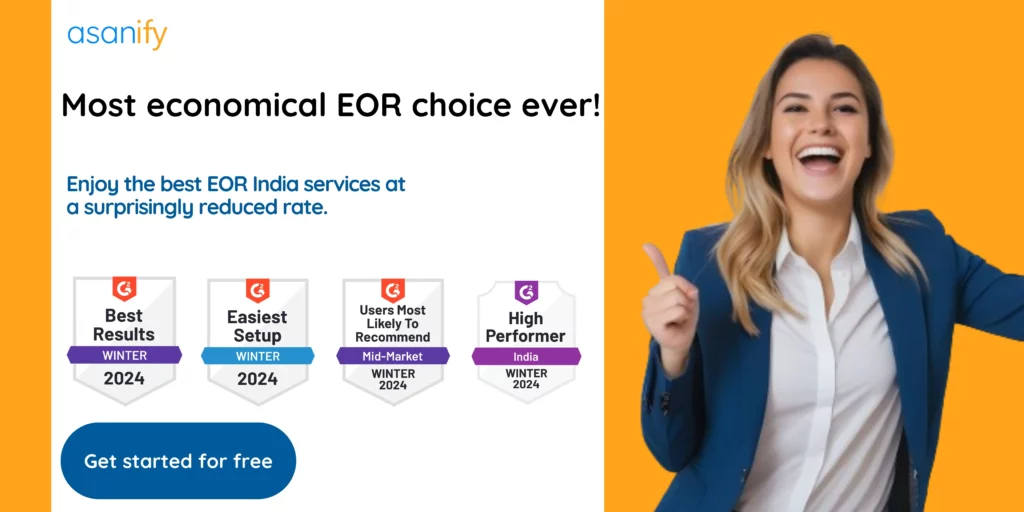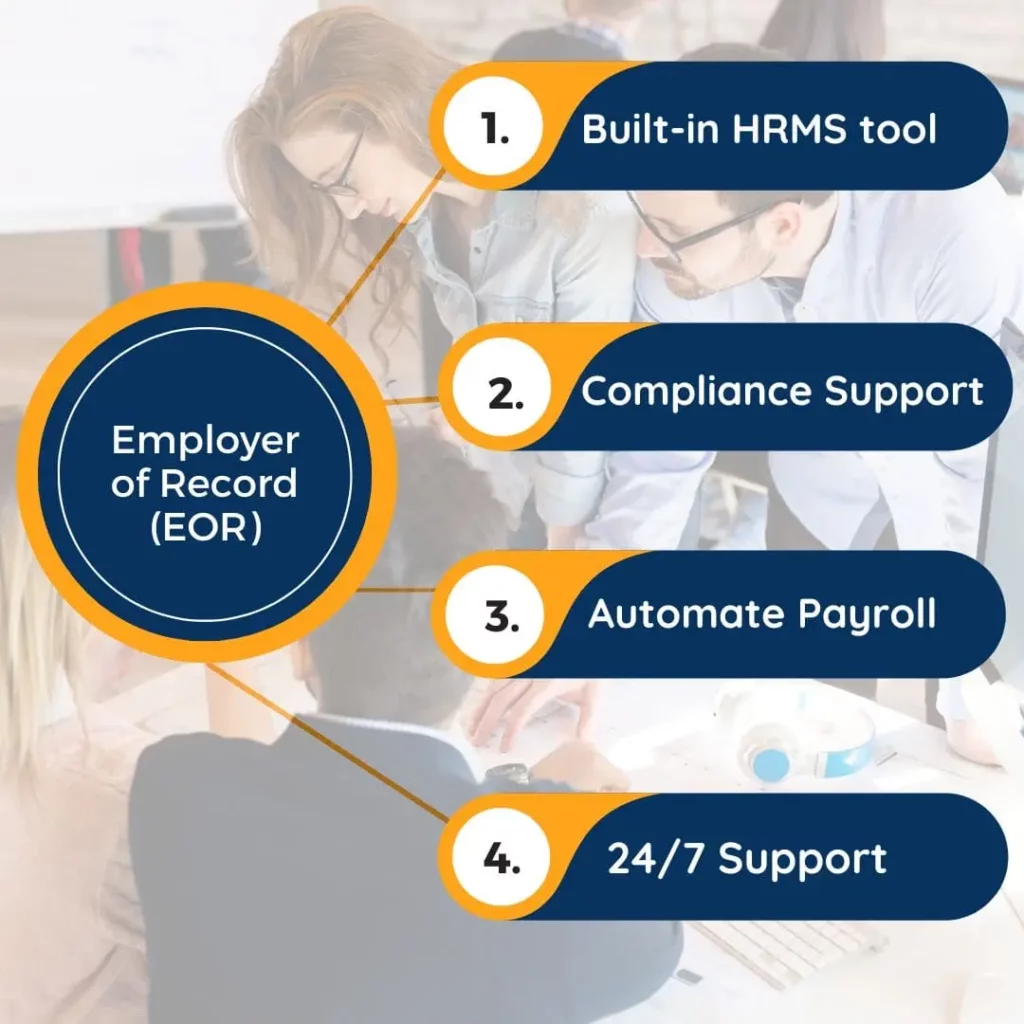Given the globalized workplace of the present day, employers make very crucial decisions on how to manage employees in a multi-geographical location workplace. Two prominent solutions in this context are EOR vs payroll solutions. Both aim to be user-friendly and efficient in workforce management but serve different purposes and offer diverse benefits. Here, we discuss the differences between EOR and payroll-based solutions, helping organizations determine which option works better in a fluid employment environment.
Table of Contents
- Understanding Employer of Record (EOR)
- What are Payroll Solutions?
- EOR vs Payroll Solutions: Key Differences
- Benefits of Using an Employer of Record
- Benefits of Using Payroll Solutions
- Which Solution is Right for Your Business?
- Conclusion
- FAQs
Understanding Employer of Record (EOR)
As the nature of a modern workforce changes rapidly, organizations seek innovative ways to manage their international talent. These changing demands lead to one of the newly rebranded solutions called the Employer of Record (EOR). An Employer of Record is essentially a third-party assuming the legal responsibility of employment for personnel on behalf of another organization. This would enable companies to concentrate on their core business but, at the same time, ensure that all local labor laws and regulations are adhered to. The EOR model is also very useful for those seeking to enter new markets where setting up a local entity would be too complex.
Key Features of an EOR
The first significant advantage of working with an EOR is that it assures full compliance with local employment laws, tax regulations, and labor standards. This is critical for companies operating in different jurisdictions since it ensures reduced risks of penalties resulting from infringement of the law and enhances the stability of operational functions.
An EOR can assume the responsibilities for managing employee contracts, payroll administration, and benefits. This will cover everything, from employment agreement to health insurance, and, therefore, help save processes for the employer and give a sense of comfort for issues that are compliant.
EORs enable cross border talent recruitment. They help clients locate, recruit, and onboard employees worldwide by acquiring talent from any part of the globe that may serve as an enabler to source diverse skill sets and meet business needs in different parts of the world.
Suggested Read: What is an Employer of Record (EOR)?
What are Payroll Solutions?
Definition and Role of Payroll Solutions
These consist of systems and software, which help automate the processes of employee compensation management. They are important in ensuring accurate and timely payments to employees while handling any related tax obligations and reporting requirements. Payroll solutions provide tools and services in managing the payment of employees, tax calculation, and adherence to financial regulations. They therefore play a significant role in ensuring that employees’ needs are met and that an organization is legally compliant in the processes of payroll processing.
These solutions often include tasks in managing:
- Salary Distribution: This stage focuses on producing payments that are delivered on time and without errors to employees.
- Tax Management: Calculation of payroll taxes and going through tax submissions.
- Reporting: Providing report generation for internal review and auditing.
Companies can leverage payroll solutions to simplify payroll in any region as tax laws and currencies vary. This simplification leads to less human error and also increases operational efficiency.
Core Features of Payroll Solutions
- Salary Payment Automation: Automated salary payment features ensure the employee is paid without human interference, thereby reducing error rates and delaying salaries.
- Tax Management and Reporting: The payroll solutions should enable a business or organization to accurately calculate, withhold, and report taxes in order to keep abreast with local regulations and reduce tax-related risk factors.
- Integration with Accounting and HR Systems: Payroll solutions can be integrated with other accounting and HR systems thus ensuring that all financial and employee data are shared and updated and this facilitates efficiency in the organization.
The understanding of the roles that EORs and payroll solutions play within the organization can enable the organization to take control of its people and its finances as key steps toward unlocking future prosperity in an increasingly globalized marketplace.

EOR vs Payroll Solutions: Key Differences
Scope of Services
An EOR encompasses hiring, onboarding, and ensuring compliance. This model allows companies to hire talent around the globe while outsourcing all of the administrative functions of employment.
Payroll solution mainly focuses on salary processing and tax management. They take care of the logistics of payroll but do not reach into wide HR and compliance functions beyond payroll-specific rules and regulations.
Compliance Management
EORs handle full legal compliance on behalf of employees, including local labor laws, taxation, and all other employment-related requirements. This is an essential service if a company is operating in various jurisdictions.
Payroll solutions cover payroll compliance and tax obligations to a certain extent but are limited within the scope of concentration. This does not cover the more comprehensive compliance issues, such as those that handle employment contract laws or labor laws.
Employment Contracts
An EOR provides legal employer services for your company, generally managing all employment contracts and liabilities that come with hiring employees. Businesses can then pursue their core business without the full implications of employment law.
A payroll solution does not manage employment contracts. They focus only on processing payroll and do not accept or concern themselves with the functions of the full employment relationship.
International Hiring
EORs are ideal for recruitment of global talent since it is possible to onboard and manage employees from any corner of the globe but in a compliant manner with local legislation.
Payroll services are ideally suited for mature organizations with a local payroll. They’re not designed for talent intake into foreign markets or cross border compliance.
Benefits of Using an Employer of Record
Complete Compliance Coverage
EOR has simplified most of the complexities that usually encumber legal issues that involve business operations in most countries. The burdensome complexities of labor laws, tax regulations, and compliance overwhelm the business entity if it is unfamiliar with local practices; an EOR assumes those burdens and makes sure that all employment practices are followed in accordance with local regulations.
Full Employment Lifecycle Support
EORs provide end-to-end support in the employment cycle that ranges from recruitment to termination. These include all activities-from sourcing and hiring talent to onboarding, payroll, benefits administration, and offboarding. That is one reason why businesses can apply their resources strategically towards initiatives that create growth and innovation by outsourcing such fundamental HR functions to the EOR.
Ideal for Businesses Without Local Entities
It supplies the international gateway for companies to find out talent and recruit without a local presence, utilizing an EOR as one-stop portals for efficient recruitment management and compliance. They ease the process of hiring because they take care of the administrative burden concerning local laws and employment practices.
Benefits of Using Payroll Solutions
Streamlined Payroll Management
Payroll solutions help the company automate salary payment and tax filing so that the compensations are actually paid in time and without mistakes. Therefore, the errors here are very minimal; administrative tasks are reduced to a great extent, so payroll management becomes very efficient.
Cost Efficiency
Payroll solutions offer cost-effectiveness for companies which function in their domestic area. As payroll solutions cater to the core functionalities in payroll without involving global employment management complexities, organizations can look to manage payroll in an easy manner with minimal chances of running into compliance pitfalls and costs associated with dealing with payroll issues in various jurisdictions.
Suggested Read: Payroll Outsourcing – The Ultimate Guide with Advantages and Disadvantages
Which Solution Is Right for Your Business?
When to Choose an EOR
If your business will expand into new markets or hire employees in countries where you have no local presence, an EOR is ideal. You can thus efficiently and compliantly hire employees there. EORs hold complete compliance management, ensuring all local labor laws and regulations are administered, which is an effective way of reducing legal risk in unknown lands.
When to Opt for Payroll Solutions
Payroll solutions are ideal for businesses that already have a local legal presence: if your company already has a legal presence in a certain region, payroll solutions would prove helpful in running your payroll processes with smooth ease. Payroll solutions streamline salary distribution and tax management but require you to manage other compliance issues independently.
Conclusion
In a nutshell, EORs and payroll solutions are differing ways that will change the business strategy you apply. EORs are best suited for businesses that want to expand globally without taking local entities and would like to have complete compliance managed. Payroll solutions are good for businesses that have been running locally for some time now and want to make payroll more streamlined but want to handle their compliance issues otherwise.
Reflect on your business’s size, expansions, and compliance needs as you consider your choices. There are instances where using both will allow you to better address your concerns according to your business goals.
FAQs
EORs also take care of all the aspects of an employment cycle including all matters of compliance and contracts. Whereas payroll solutions only care about processing the salary of employees and managing their payroll taxes.
An EOR will be useful when you want to enter international markets or need employees but don’t want to have a local presence there.
Payroll solutions are primarily crafted for local compliance. For international workers, an EOR should be used for law duties in various countries.
EOR usually encompasses compliance and employment management due to administrative fees, whereas payroll solutions involve subscription fees or the costs of each transaction. The cost will depend on various providers.
Yes, companies can make use of both solutions. An EOR can manage any international hiring as well as compliance processes, while payroll solutions may take care of payroll for employees in established local entities.
Not to be considered as tax, legal, financial or HR advice. Regulations change over time so please consult a lawyer, accountant or Labour Law expert for specific guidance.




